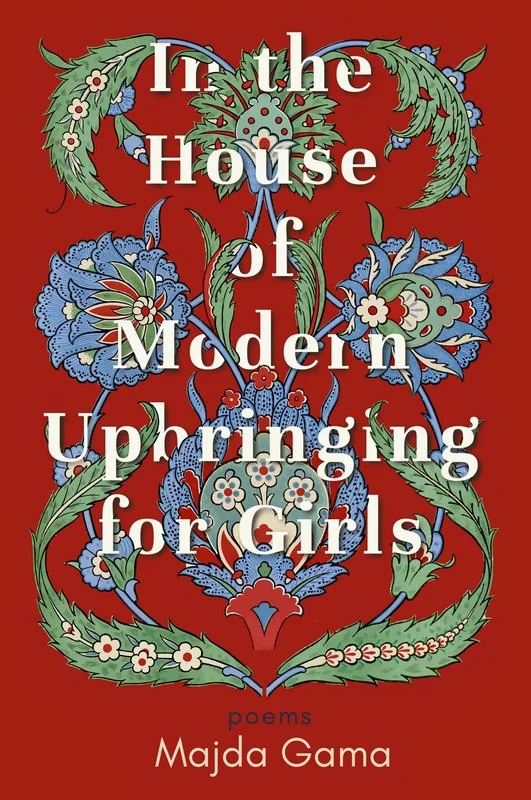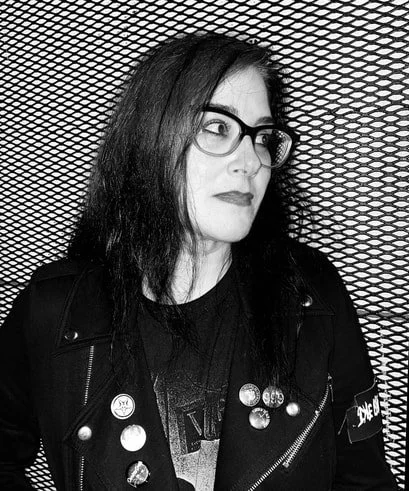Songs of yearning
a review of In the House of Modern Upbringing for Girls
by Gregory Luce
“I am Arab./ We live for songs of yearning./ They pour from our pens/ Like pressed olive oil.” (“Dovesong”)
Rarely has a collection of poems so perfectly embodied the experiences of the poet as does In the House of Modern Upbringing for Girls, by Majda Gama. Gama, born in Beirut to a Saudi father and an American mother and now residing in the D.C. area, has chronicled her life of moving between cultures and identities before coming to at least a temporary rest here. This book, her first full-length collection and published appropriately by Wandering Aengus Press, is the best volume of poetry I’ve read so far this year and likely for a long time to come.
The book’s title refers to a girls’ school that the poet attended as a girl. The attraction of art outside the Islamic-based curriculum already exerts its hold on the poet. While her schoolfellows race outside for break, she remains indoors:
“Girl fingers unclasp
a tin pencil case of Caran D’ache
long, fine drawing pencils in primary shades….
When the school bell rings, I shut up
my colors and file into the dark
room for Quran memorization lessons.
We wrap our hair in white and sing.”
(“In the House of Modern Upbringing for Girls”)”
In “Meeting Jibreel,” the poet shows a glimpse of her American side during Quranic study:
“In my Quranic primer of short, and long, verses
I scrawled in the margins with metallic ink.
I learned the name of an angel, as my body
Shaped a conduit from aya to hand to pen.
I grounded pre-teen words like “cool” and “ok”
While the class chanted the story of visitation….”
This poem also shows examples of one the collection’s most daring and fascinating elements, the layering of untranslated Arabic words into the poems. “Aya,” above (meaning verse of the Quran, but carrying secondary meanings that add to the word’s resonance), is one example of many that appear throughout the book. The risk the poet takes in avoiding definitions pays off well in the enrichment of texture this practice lends to the poems. It functions in the way sampling in music does (apropos given the many poems that refer to the poet’s musical experiences), adding layers of meaning and pointing to sources and influences.
In fact, a large number of poems herein detail explicitly with the poet’s travels through Western (or perhaps Global Northern would be more apt) popular music culture, in particular punk, which implies an entire subculture including but not limited to the music. Several of these pieces describe her attending shows or gathering with friends at iconic D.C. places such as The 9:30 Club and P Street Beach. These will particularly resonate with readers, like me, arrived in the DMV in the 80s and 90s and discovered these places ourselves.
I found one poem especially powerful in illustrating the poet’s transition from punk to poet:
“You can’t pass out to Diane Seuss
on the turntable while a burning cigarette
Flirts with your knuckles….
I would. Forgo friends’ DJ nights for open mic,
Oh, I hate myself for blinking under the klieg-light
When I could be dancing to White Punks on Dope….
I’m safety pinned together now by
Emily Dickenson’s—dashes—by
The fishnet stockings of her alliteration:
Oi, oi, oi! The Soul selects her own society.”
(“When Did Poetry Become My Rock’n’Roll?”)
The last poem I want to bring to your attention is “Why Aren’t You Just American?, which beautifully sums up the complexities of what Gama calls “the hybridity of being a hyphenated American,” which no doubt mirrors the experience of many immigrants:
“What is asked is not a question
A brown body can answer
Because that body is busy, being brown.
That body is in fight or flight.
That body is continually
Liminal….
Because a body from Appalachia
Can be Scots-Irish
& that’s a heritage, a birthright,
A calling, a place to be….
Brown can be pale too.
& spice—didn’t you ever
Drink tea made from
Prairie grass, or
A Bohemian beer in Chicago?...
[T]hey smile
With white teeth
While picking you apart
For too many consonants
In your name, for praying
with cupped hands
For leaving to visit
Your ancestors & coming back
Why don’t you just stay over there?
I answer,
Don’t you hear my answer?”
(Watch and listen to Majda read the entire poem and read more about her here.)
I would love to continue to go through this book and quote many more passages, but the only true way to do it justice would be to reproduce it in full. So I urge you to order your own copy. And visit Majda's website for more about her.
Majda Gama is a Beirut-born, Arab American poet based in the Washington, DC area. She has read her poetry and contributed to panels at the PEN/World Voices Festival, the Lit Crawl, and Split This Rock. Her poetry has appeared in diverse journals both nationally, and internationally. Majda also curates and co-hosts the Café Muse Literary Salon.
Gregory Luce is the co-founder and poetry editor of Washington Unbound. He has published six chapboks. He lives in Arlington and serves as Poetry Editor of The Mid-Atlantic Review and writes a monthly column for the online arts journal Scene4.


